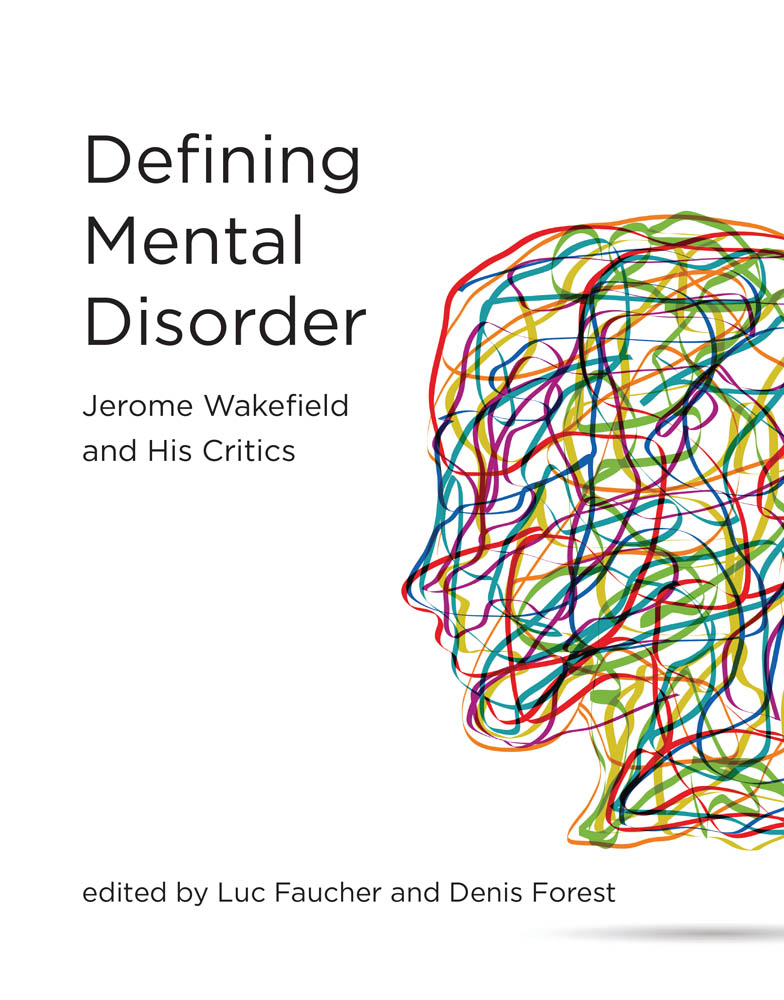Defining Mental Disorder
Jerome Wakefield and His Critics

Download Url(s)
https://doi.org/10.7551/mitpress/9949.001.0001Contributor(s)
Faucher, Luc (editor)
Forest, Denis (editor)
Language
EnglishAbstract
Philosophers discuss Jerome Wakefield's influential view of mental disorder as “harmful dysfunction,” with detailed responses from Wakefield himself. One of the most pressing theoretical problems of psychiatry is the definition of mental disorder. Jerome Wakefield's proposal that mental disorder is “harmful dysfunction” has been both influential and widely debated; philosophers have been notably skeptical about it. This volume provides the first book-length collection of responses by philosophers to Wakefield's harmful dysfunction analysis (HDA), offering a survey of philosophical critiques as well as extensive and detailed replies by Wakefield himself. HDA is offered as a definition of mental disorder, but it is also the outcome of a method—conceptual analysis—and contributors first take up HDA's methodology, considering such topics as HDA's influences on the DSM, empirical support for HDA, and clinical practice. They go on to discuss HDA's ultimate goal, the demarcation between normal and abnormal; the dysfunction component of the analysis, addressing issues that include developmental plasticity, autism and neurodiversity, and the science of salience; and the harmful component, examining harmless dysfunction, normal variation, medicalization, and other questions. Wakefield offers substantive responses to each chapter. Contributors Rachel Cooper, Andreas De Block, Steeves Demazeux, Leen De Vreese, Luc Faucher, Denis Forest, Justin Garson, Philip Gerrans, Harold Kincaid, Maël Lemoine, Dominic Murphy, Jonathan Sholl, Tim Thornton, Jerome Wakefield, Peter Zachar
Keywords
Psychiatry; disorder; dysfunction; harm; Wakefield; Diagnostic and Statistical Manual DSM; function; Harmful Dysfunction Analysis; Mental disorder; Evolution; DSM; Critics; Spitzer; distress; disability; harmful consequence; dysfunction requirement; Experimental philosophy; proper function; Theories of mental disorder; theory-neutral; conceptual analysis; armchair; Pluralism; intuitions; Clinical practice; concept of disorder; Haslam; constructs; Attention-Deficit Hyperactivity Disorder; definition; psychiatric classification; Quine; biological design; naturally selected disorder; environment mismatch; Essentialism; open concept; construct validation; latent variables; imperfect community; neo-empiricism; decline in functioning; Szasz; network theory; Stipulation; meaning analysis; abnormality; Selected-effect; causal-role; Boorse; descriptive; natural kinds; Cummins; intuition; Mechanistic explanation; perspectival; coherence; Developmental mechanism; developmental mismatch; adaptation; Evolutionary mismatch; modal mismatch; depression; fever; lactose intolerance; Neander; proximal-function; distal function; conduct disorder; developmental disruption; Low-level mechanisms; salience system; dopamine regulation; aberrant valuation; delusions; adaptationism; cognitive neuroscience; mechanical-causal analysis; belief fixation; syndrome; Autism; modules; ontogeny; neurodiversity; Reductionism; naturalism; Wittgenstein-Kripke paradox; normative; failure; indeterminacy; variation; detrimental consequences; individual values; directindirect harm; clinical significance criterISBN
9780262362931, 9780262045643Publisher
The MIT PressPublisher website
https://mitpress.mit.eduPublication date and place
Cambridge, 2021Imprint
The MIT PressSeries
Philosophical Psychopathology,Classification
Psychology
Psychiatry
Psychology
Psychiatry

